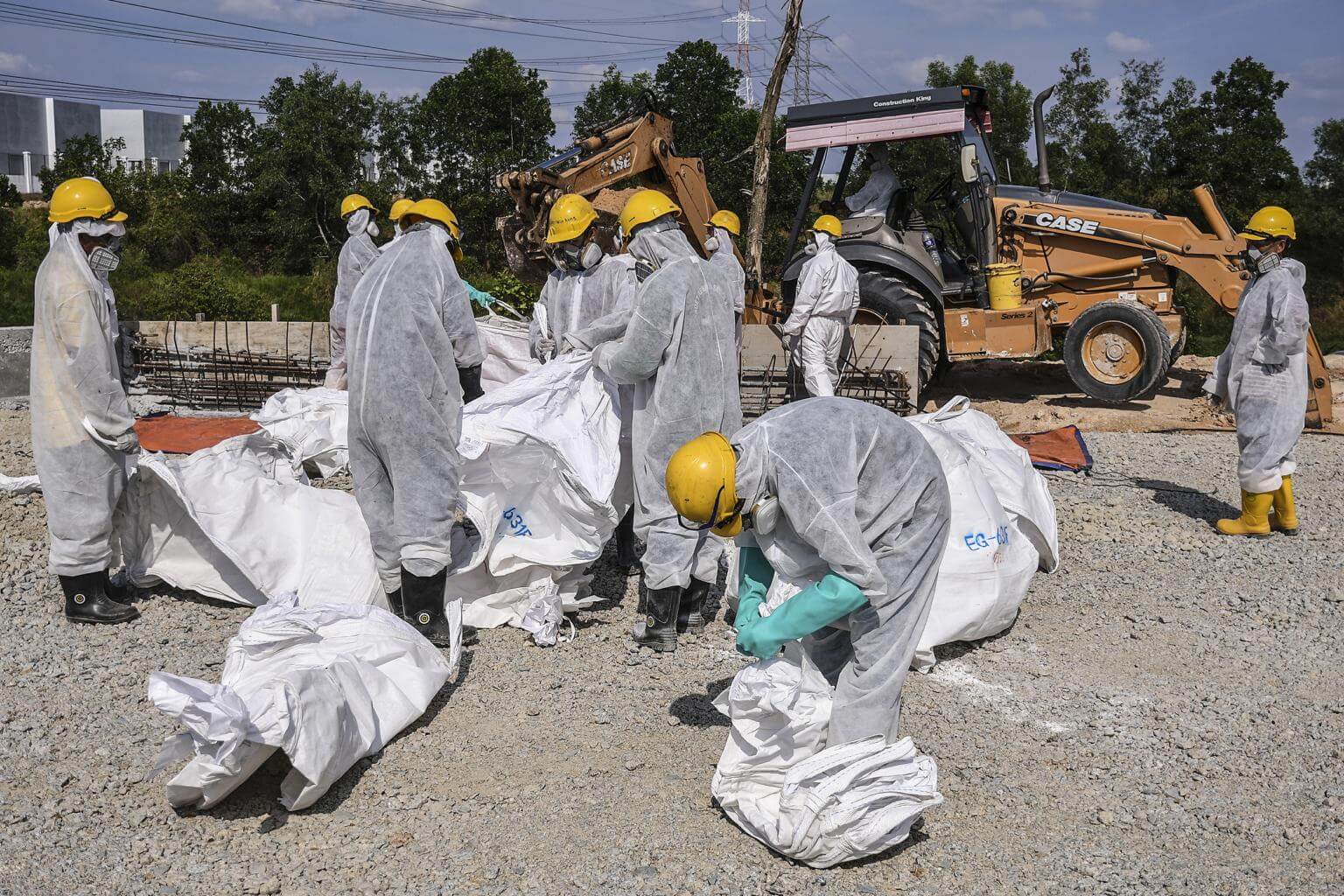Pasir Gudang chemical spill: Unsung heroes work round the clock to treat victims, contain pollution
Sign up now: Get insights on the biggest stories in Malaysia

Emergency personnel wearing protective suits prepare to clean up the Sungai Kim Kim river in Pasir Gudang, on March 14, 2019.
PHOTO: EPA-EFE
PASIR GUDANG (THE STAR/ASIA NEWS NETWORK) - The unsung heroes working to contain the Sungai Kim Kim chemical pollution in Pasir Gudang are forced to endure long hours not just to treat the victims, but also carry out detection for chemical substances around the area, collect samples and even carry out cleaning works.
More than a dozen agencies have been involved in the process for the past 11 days. They are mobilised from around the country.
Meanwhile, a joint statement from four Singapore agencies on Monday (March 18) said Singapore's air and water quality, and water supply "continue to remain unaffected" by the Johor incident.
The statement was issued by the Agri-Food & Veterinary Authority of Singapore (AVA), National Environment Agency (NEA), PUB - Singapore's National Water Agency, and the Singapore Civil Defence Force (SCDF).
In Pasir Gudang, one person involved is Fire and Rescue Department's hazardous materials (Hazmat) specialist M. Murugiah, who was in the midst of teaching firemen at the department's training college in Kuala Kubu Baru, Selangor, when he received his deployment orders to move to Johor at 10am on March 12.
"I immediately dismissed my class and packed up and was on the way to Johor within 30 minutes," he said, adding that presently there are 10 Hazmat teams carrying out checks and surveillance around the clock.
"We carried out decontamination works for the teams moving in and out of ground zero at the river and also for people entering the Pasir Gudang stadium for check-ups," he said, adding that his team was also tasked with collecting about 20 air, water and soil samples daily for real-time analysis.
Asked how they have been coping, he said that as firemen, they were used to roughing it out anywhere.
"There is a lot of planning and movement of personnel, as this is an operation which covered a huge area," said Mr Murugiah, who has spent 25 out of 30 years' service as a Hazmat specialist.
Asked whether this is one of his most challenging assignments yet, he said it is, as it involves a huge area and various kinds of chemicals.
Mercy Malaysia medical volunteer Soh Yih Harng, 34, who was part of the initial team deployed to help the victims in Pasir Gudang, said they were short-handed at first.
"I arrived in Pasir Gudang from Melaka at about 2am on March 14 and started my shift at 8am.
"We have more medical volunteers now and that allows us to see as many patients as possible," Dr Soh said when met at the medic base at the Pasir Gudang Indoor Stadium.
For Malaysia Civil Defence Force (APM) ambulance driver Muhammad Atikullah Aziz, 31, it has been hectic since he was deployed to the area, as he makes between five and seven trips taking people from the stadium to the hospitals.
"A lot of agencies also sent ambulance drivers to help out here and that has allowed us to respond faster to emergency calls.
"I hope that the situation here will go back to normal soon," he said.
Malaysia Red Crescent volunteer Amy Sim, 32, hopes that their presence will help reduce the burden of all agencies involved in the rescue mission here.
"Some of the volunteers would come after work while some even took leave to help and counsel the victims here.
"I have been here since I finished work on Friday and will try to stay to help out as long as I can," said Ms Sim, a teacher.
The technical director of the main contractor involved in the cleaning up of Sungai Kim Kim, Mr N. Shanker, 52, has been working around the clock with his team to clear up a 1.5km stretch.
"We have support from two other contractors to clean up the river here.
"About 90 people are involved in the exercise, with half working the day shift and the other half the night," he said when met near Sungai Kim Kim.
He added that all agencies involved have been working tirelessly for 24 hours daily to purify the river since last Wednesday, and he is glad that the process to salvage the river has been completed, with only a little micro-cleaning left to work on.
Mr Shanker, who has 12 years' experience in this field, said this is the first time he is removing chemical waste from a river.
"Most of the cases that we have been involved in are those involving internal chemical spillage in industries," he said.


